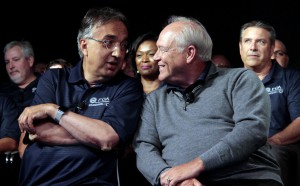
FCA's Sergio Marchionne and UAW's Dennis Williams share a laugh recently. The union selected FCA as the target company in talks.
Contract talks between the United Auto Workers and Detroit’s three automakers entered their final phase as the union selected FCA U.S. as the target for finalizing a new labor agreement for three domestic carmakers.
Brian Rothenberg, UAW senior communications adviser, the selection roughly 36 hours ahead of the expiration of the current contract at 11:59 p.m. Sept. 14.
FCA US LLC confirmed a short time later that it has been selected as the company to set the pattern on a collective bargaining agreement with the UAW, but declined to comment further on the process.
The statements from the company and the union also obliquely confirmed the union is looking for a pattern agreement, containing wage and benefit provisions that could be imposed not only FCA U.S., but also General Motors and Ford.
“All three companies are working hard toward a collective bargaining agreement,” said Dennis Williams, president of the UAW. “All three companies have been working with UAW bargaining teams toward a collective bargaining agreement and continue to do so,” he said.
The contract deadline carries more weight than in the 2011 negotiations when the UAW could strike neither FCA U.S., the old Chrysler Group, nor General Motors under the terms of earlier agreement that permitted the reorganization of both companies under the protection of federal bankruptcy laws.
The no-strike requirement had been imposed by Republicans in the U.S. Senate as part of the bailout packages for both companies.
(UAW holds off on picking strike target as talks continue. For more, Click Here.)
As the target company, FCA U.S. could face a strike in the early morning hours of Sept. 15.
Fiat Chrysler was the most logical target for the union, which was looking for a way to end the two tier wage agreement signed when the domestic industry slid to financial ruin during the 2008 recession.
Williams, however, has vowed to end the tier system, where new workers are paid significantly less than long-term employees. Roughly 40% of FCA U.S. employees in the U.S. are at the second step where workers earn about $16.60 per hour, compared to the $30 per hour wage collected by workers with union seniority.
Fiat Chrysler has more first-tier employees than Ford or GM.
(Click Here for details about the problems with GM’s plans to import from China.)
The union also was looking for a raise for seniority workers, who have not seen a wage increase since 2006 and have lost roughly 4% of their purchasing power because the automatic cost-of-living adjustments that were taken out of union contracts during 2009 bankruptcies of GM and Chrysler, FCA’s predecessor.
FCA also wound up in the UAW’s crosshairs this year because even a short-strike would impose a substantial financial penalty on the company since it has a relatively small inventory of vehicles sitting on dealer lots. FCA’s inventories of key vehicles, such as the fast-selling Jeep Grand Cherokee and the Jeep Wrangler and Jeep Cherokee, both of which are built at plants in Toledo, Ohio, are in relatively short supply even though the company’s dealers are holding a 65-day supply of unsold vehicles.
Williams also has said health care and the continuing growth of Mexico as an export platform are also key items on the union’s agenda. Williams wants to see the flow of investment into Mexico slowed or stopped via the contract language.
(To see more about what the UAW’s negotiating strategy involves, Click Here.)
In addition, FCA U.S., because of its relatively young work force could see its costs increase in in an industry-wide health-care pool. But it would also have the most to gain, particularly in a long recession, from pooling its health-care resources with those of its two larger rivals, who would in effect own a large share of the health-care obligations longer term.
